|
Four men with differing business interests, all of whom have recently lost their licence for drinking and driving offences, meet for the first time at the alcohol management course they are required to attend as part of their probation. Young Jimmy (Greg Chisholm) has been bequeathed an empty company warehouse by his recently deceased father, a property that he is keen to sell so that he can launch an internet café chain. Paul (Rupert Procter) is a past-his-prime salesman who always on the lookout for possible money-making deals, and whose rampant alcoholism is tearing his marriage apart. Mark (Mark Devenport) is an easily-led co-owner of a one-vehicle taxi business with his flatmate Dave (Johann Myers). Richard Stevens (Hywel Bennett) is a successful and wealthy property developer who sees the course as nothing more than an inconvenient but necessary formality.
Just half a day into the course, in a heart-warming display of what they’ve learned so far, Paul, Mark and Jimmy elect to spend their lunchtime at the local pub and sink a few jars. The pub in question soon becomes their base of operations, a venue in which they convene every lunchtime and every evening after class, and where they consume vast amounts of the very liquid that landed them on the course in the first place. It’s here that Paul hatches a plan to help Jimmy sell his warehouse to Richard, a process that will first involve slowly buttering the property magnate up, something Jimmy and Dave offer to assist with for a small cut of the resulting proceeds. Eventually, Richard joins them on their nightly drinking sessions, but by then Jimmy is becoming distracted by pretty young barmaid Eve (Micaiah Dring), who appears to be as attracted to him as he is to her.
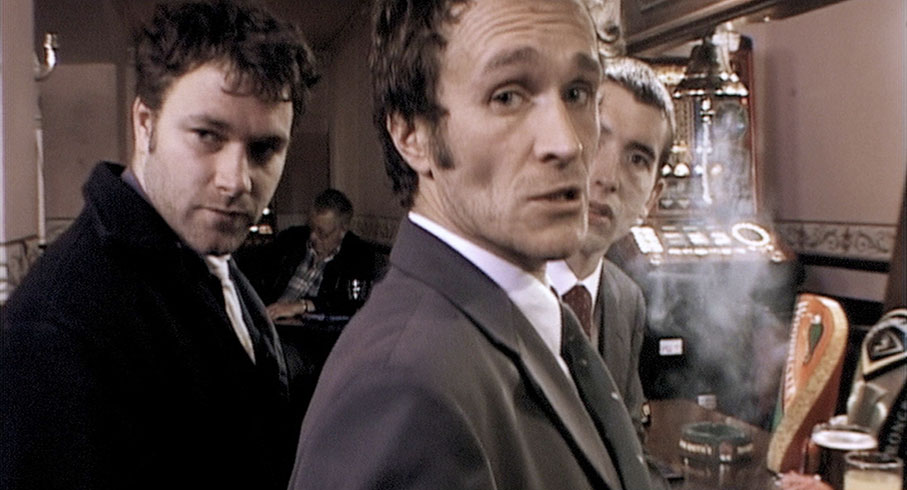
Story-wise, there’s nothing too surprising here, but for first-time feature writer-director Chris Cooke this is just a skeleton on which to build a study of four self-centred men who are all looking for an escape route from unsatisfying lives. What stands the film apart, and has drawn comparisons to Neil Labute’s In the Company of Men (1997), is that the four men in question are not loveable and witty, but unlikeable arseholes whose unhappiness appears to be largely of their own making. Jimmy dreams of running his own business, but having been handed one for free has no idea what to do with it apart from offloading it to someone else. Paul is a ball of pathetic self-delusion, convinced that he’s still the salesman he may well once have been, and desperate to worm his way back into his family’s life without changing the aspects of his personality that caused them to split in the first place. Mark lacks anything approaching motivation and seems happy to just ride along with Dave while he ferries their passengers, and while Richard initially seems to have everything that that he could desire, he is a lonely man who aches for a woman to share his success with, and projects all of his love onto his racehorse instead.
Easily the worst of the bunch is Paul, a man so wrapped up in a coat of self-delusion and self-pity that he seems incapable of considering the feelings of others for more than a few seconds at a stretch. Every time the group hits the pub, he necks beer like it’s going out of fashion and spends a good part of the film in a state of slurring intoxication. So fed up with his drinking, his behaviour, and his inability to satisfy her has he be become that his wife Mary (Penny Linfield) has thrown him out of the house, forcing him to camp in the garden in a tent that he has had to borrow from Jimmy. One rainy night he distracts Mary while she is dining with her friend Patti (Dena Smiles) and slips back into the house to help himself to their food, greeting Patti as he enters as if he has simply arrived home late from work, and ignoring Mary’s subsequent frosty stares. He repeatedly browbeats Jimmy for being distracted by Eve, and later does something so selfishly nasty behind the young man’s back that there will be few who do not want to kick him squarely in the balls.*
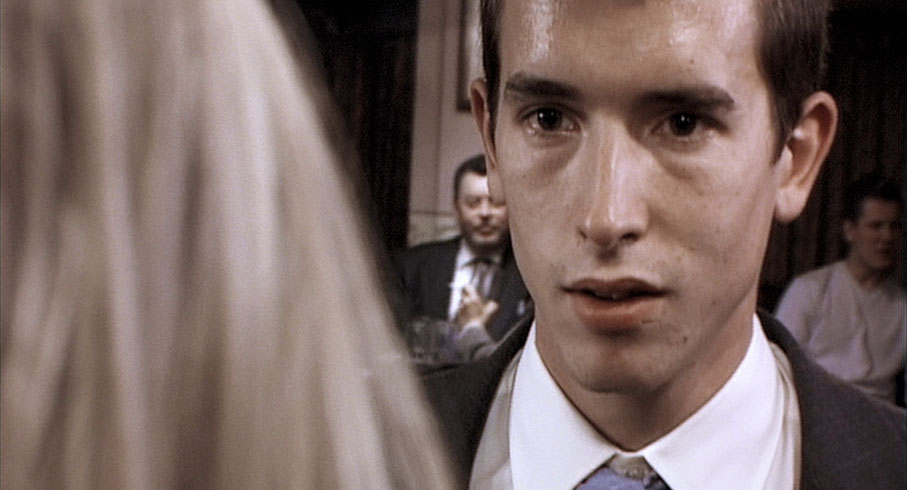
Jimmy’s main weakness is his inherent weakness, if that makes sense, a by-product of youth and inexperience that leaves him lacking the self-confidence to realise the opportunity for happiness and fulfilment that would likely result from focussing all of his attentions on Eve instead of being repeatedly led astray by the avaricious Paul. When he does get the chance to spend the night with her, the serial drinking that has become part of the group’s raison d’être ultimately scuppers any chance he has of a sexual encounter. In what has to be a moral low point for him in the film, he invites his lonely mother Liz (Julie Legrand) along to the pub one night in the hope that Richard might take a shine to her and look kindly on his deal as a result. When Liz finds herself as attracted to Richard as he is to her, however, Jimmy becomes increasingly tormented by the thought of the two together and the idea that he effectively pimped his mother out to further his own agenda.
Mark proves to be the most easy-going and inoffensive of the group, a directionless hanger-on who instigates little but goes along with just about anything that Paul suggests without much thought given to how it might play out. Like Richard, he’s essentially a lonely man who prefers the company of just about anyone to the thought of spending even a few hours alone. When Dave makes moves to take the taxi out one evening, Mark keeps pestering him to be allowed to ride along with him, something Dave is clearly fed up with him doing. When all of his pleas fail, Mark instead offers to share his weed for a space-out smoke, stopping Dave in his tracks and ultimately keeping him in the now content Mark’s immediate orbit.
Running through the film, and bringing a ray of sunshine to what would likely have proved heavy going as a realist drama, is a strain of character comedy so deadpan that it may well fly over the heads of those unsympathetic to Cooke’s approach. There are few (if any) outright gags here, the comedy growing instead from the characters’ self-delusion and misery and the situations that they find themselves in as a result. The alcohol management classes may be an easy target for mockery, but Cooke still scores a few small bullseyes here, including the sort of “catch the ball and answer” nonsense that also went on to be similarly mocked in an episode of The Thick of It. Selling the course as oddly plausible regardless is actor Jonny Phillips as group leader Ian, his po-faced sincerity at one point flipping to reveal a man who is clearly wrestling with his own set of barely held in check demons. A team-building session of woodland paintballing pits this motely crew against a team of teenage car thieves (one of whom is played by Joe Dempsie, who went on to have a recurring role in Game of Thrones), whose amused mockery of their older opponents only adds to their self-pity, and includes a brief but amusing nod to a key moment in Oliver Stone’s Platoon.
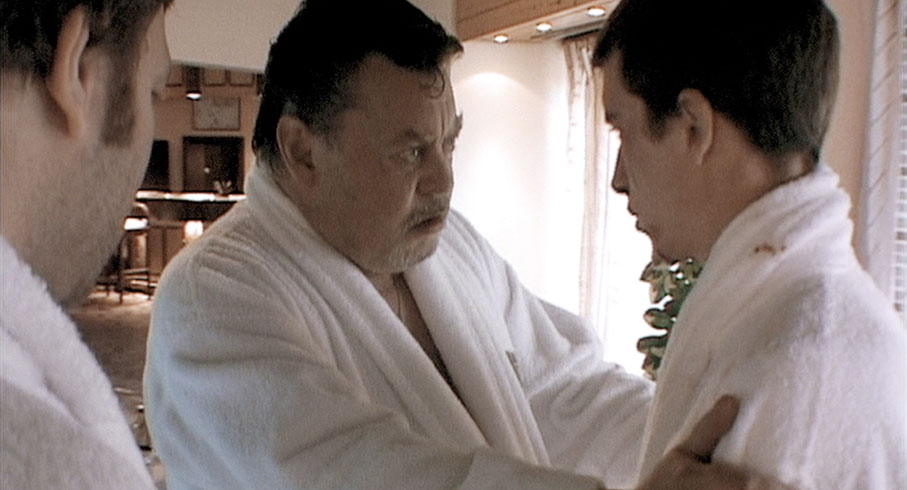
Stylistically, the film stands apart from just about every other British film of the period, primarily due to Cooke’s decision to shoot not on 35mm, but on handheld DVCAM video, and then grade it in the colours of – in Cooke’s own words – “tobacco, lager and piss.” This gives the film a grubby, grabbed-on-the-fly aesthetic that will probably have those who like their movies to have a polished visual sheen groaning in horror. But at a time when features are meticulously lit and graded for pin-sharp HD, and almost every presenter-based YouTube video has been lit with soft box lights and colour graded with LUTs, revisiting the charged, rough-and-ready visuals of Cooke’s film feels like a too-rare breath of invigorating air. This visual style also aligns the film to some degree with the work of the Danish Dogme 95 movement, particularly Thomas Vinterberg’s Festen (1998), whose drive and focus on characters Cooke’s film also has in abundance, and as many have observed, there’s more than a whiff of Shane Meadows to the grounded naturalism of the setting and performances. The energy of the camerawork (courtesy of cinematographer Nick Gordon Smith and – especially – camera operator Steven Sheil) is further enhanced by Nick Fenton’s dynamic editing, which takes its cue from Cooke’s earlier short films and plays with structure in a way that reflects the drunkenly chaotic mental state of its central characters without ever becoming a confusing mess. Simultaneously impressionist and expressionistic, it accelerates the pace of the film and occasionally adds to its underlying sense of fun, mixing the observational with the subjective, making effective use of jump cuts and slow-motion, and peppering the character introductions with filmed memory fragments and illustrative cutaways. It also provides the film with one of its oddest moments, which takes place during the first alcohol management session after everyone except Richard and Ian have departed for lunch. As the two men sit silently in the hall in which the class is being held, this simple exchange occurs:
| Richard: |
Ian? |
| Ian: |
(looking up from his notes) Yes, Richard? |
| Richard: |
(taking off his glasses, rubbing is nose and pausing as if about to ask the most awkward of questions and speaking in a hesttant manner): “Ah…” |
The film then cuts back to the pub in which Paul, Jimmy and Mark are drinking, and the content of the conversation that presumably unfolded is never revealed or referenced again. Many times I’ve wondered what was said between the two, and yet each time I watch this sequence it makes me smile. Maybe it’s just me.
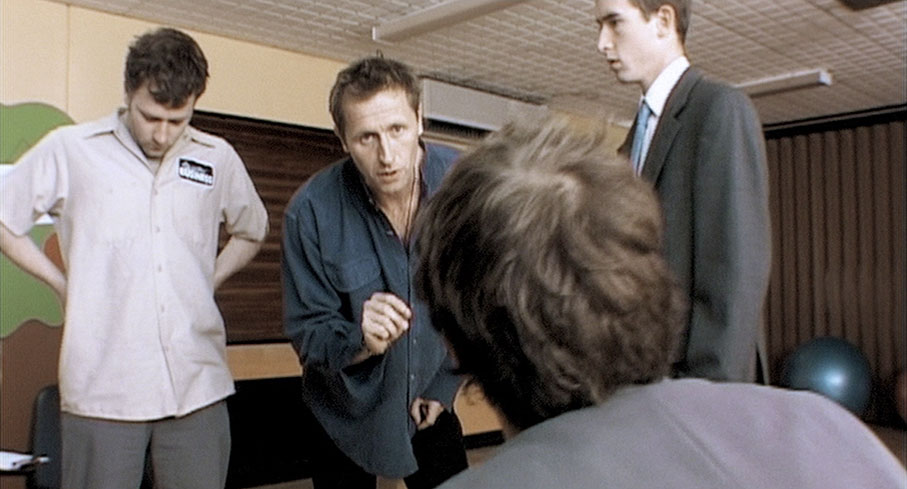
Research suggests that One for the Road remains something of a polarising film, though it was on the whole most positively reviewed and enjoyed a limited but successful theatrical run. Its lead characters are largely unlikeable, its visuals as far from the polish of a big budget Hollywood movie as you could imagine, and its dark humour will likely be invisible to those not attuned to Cooke’s distinctive approach. Those who dislike it often seem to really dislike it, and while I get where they’re coming from, I just don’t agree. I have a real soft spot for this inspired, superbly acted, visually and aurally energised study of self-centred capitalistic machismo and the inability of those caught in its grasp to effectively communicate, even with themselves. It’s a film that we screened at the film society I used to co-run (thanks a lot, Covid) to a receptive audience, and revisiting it after almost 19 years was a rare and welcome pleasure. The only mystery for me, one not answered by any of the special features, is why a clearly talented artist like Cooke appears not to have made another feature since.
Oh, this is a tricky one. One for the Road was shot on DVCAM, a Standard Definition format with a far lower resolution than modern HD, a 4:3 format that produced 16:9 imagery by anamorphically compressing and expanding the image, which here has been slightly reframed to its theatrical projection ration of 1.85:1. Adding to the potential problems for any transfer is Cooke’s decision to shoot in available light whenever possible, which was a challenge for even the best SD camcorders. A showcase for the Blu-ray format this was thus never going to be. That said, image sharpness and detail is not at all bad in close-ups, but does soften noticeably on wide shots, and while the contrast range is often better than expected and the black levels are solid, there is some slight burnout on highlights, a common problem with the lower dynamic range of SD. The colours are true to the grimy grading of Cooke’s intentions and how I remembering the film looking in the cinema, and I have to say that even blown onto a 55-inch 4K screen, it still looks pretty damned good, at least within the constraints of the shooting format, and despite its origins, it still looks cinematic.
Two soundtracks are on offer, Linear PCM 2.0 stereo and DTS-HD Master Audio 5.1 surround. Initially, the stereo track seems to have the edge, being a little louder and artificially given more breadth by the spreading of the mono elements like dialogue between the two front speakers, whereas they sit front and centre on the DTS track. But the surround track definitely has more finesse, being less treble-weighted and really scoring on the bass notes of Steve Blackman’s rather tasty score. Despite the drunken slurring, the dialogue is always clear.
Optional subtitles for the deaf and hearing impaired are available for the main feature all of the included short films.
Many of the special features here have been imported from the 2004 DVD released by Tartan, but since that disc went out of print following Tartan’s unfortunate demise, it’s great to see them made available again on this Blu-ray, and expanded upon.
Audio Commentary with Chris Cooke, Kate Ogborn and Helen Solomon
The first of two commentaries from the DVD ostensibly features writer-director Chris Cooke, producer Kate Ogborn and co-producer Helen Solomon, but for the most part this is Cooke’s show, with only minor contributions from Ogborn and Solomon. Even then, they often simply prompt Cooke to talk about specific aspects of the film, but as he is a fountain of interesting stories about its making, I have no problem at all with this. Areas covered include the decision to shoot on DV-CAM, the problem of cutting 90 hours of footage down into a 94-minute film, how sequences were shaped in the editing stage, developing a scale of drunkenness for the actors to follow, the cinematography, the locations, the actors, the characters, the music score, the influences, and so much more. Cooke claims up front that his world view is a miserable one, and describes the four central characters as “selfish, self-motivated, egotistical wankers” who are all attempting to escape in some way, which I thought was a concise and accurate summary.
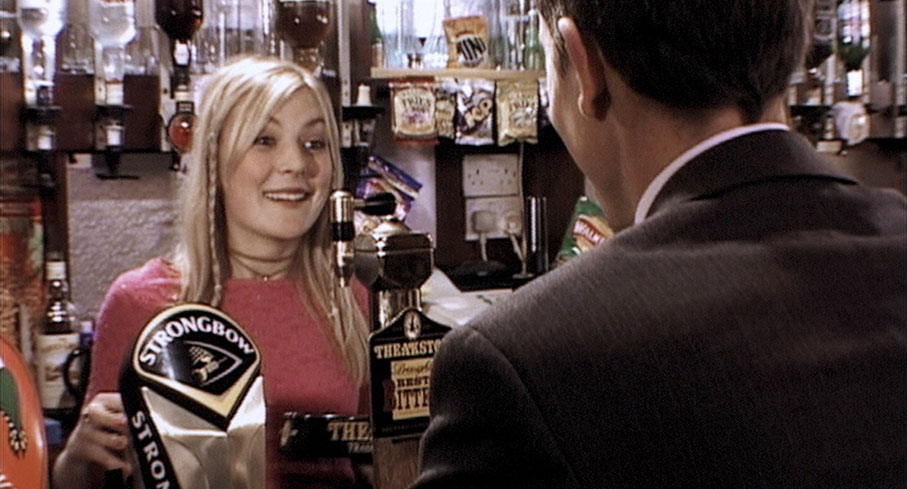
Audio Commentary with Greg Chisholm, Mark Devenport and Rupert Procter
This second commentary by three of the lead actors may be less informative about the specifics of the production than its predecessor, but it still proves revealing and is a good deal of fun. The piss-taking kicks off in the opening seconds as they mock the credit for One for the Road Productions (“They must have taken some time to come up with that”), but this is soon joined by revealing memories of the shoot and pertinent comments about their respective characters. It’s claimed that some of their friends were put off drinking after watching the film, and Chisholm tellingly describes Jimmy – whom he plays in the film – as “massively optimistic, but very, very stupid.” They recall having to drink endless amounts of alcohol-free beer, and Procter backs up Cooke’s claim in the preceding commentary that this was responsible for his for-real onscreen vomiting, which was captured by wily camera operator Steven Sheil, whose work on the film all three men praise. Procter and Chisholm do a fine job of deconstructing their characters, but its Devenport who emerges as the track’s deadpan comedy lead, particularly when Johann Myers appears on screen as his business partner Dave, prompting Davenport to bark, “Scene stealer! Thief! Call the police!” The bit that made me choke on my coffee, however, comes when Procter is talking about having to act drunk by recalling what it was like to get that pissed after 15 years of unbroken sobriety. He’s in full flow when Devenport interjects with, “I mean, your family and friends can hardly bare to watch it because it brings back memories of what an absolute cunt you were when you were drinking.”
One for the Road: An Oral History (41:44)
A brand new retrospective look at the making of One for the Road, built around interviews with writer-director Chris Cooke, camera operator Steven Sheil, composer Steve Blackman, and actors Mark Devenport, Greg Chisholm, Rupert Procter and Johann Myers. Theoretically, this may seem doomed to repeat information already delivered in the commentary tracks, but the 19 years that have passed since the film’s release give even re-trod ground a fresh perspective, and there’s a fair amount that is new to this feature. A clear breakdown of how Cooke got into filmmaking and how this feature came together is followed by memories of the shoot itself, and thoughts on the approach to the story, the characters, and the visual style. Shiel makes some excellent points about the roughness of DV and its fleeting use in film production, Blackman provides some insight on the songs used, and Cooke at one point describes his initial approach as “like John Cassavetes, but with more jokes.” There’s much more here. A welcome and worthwhile extra.
Workshop Footage (6:21)
Actors Rupert Procter (Paul), Mark Devenport (Mark) and Penny Linfield (Mary) improvise scenes in which they talk about their drinking (Paul and Mark), or in Mary’s case her husband’s failure to sexually satisfy her and his drunken lack of bladder control. Also included is handheld shot of Paul walking in an inebriated state down the street, set to music and edited in a manner that makes it look like a pitch for the style of the proposed film.
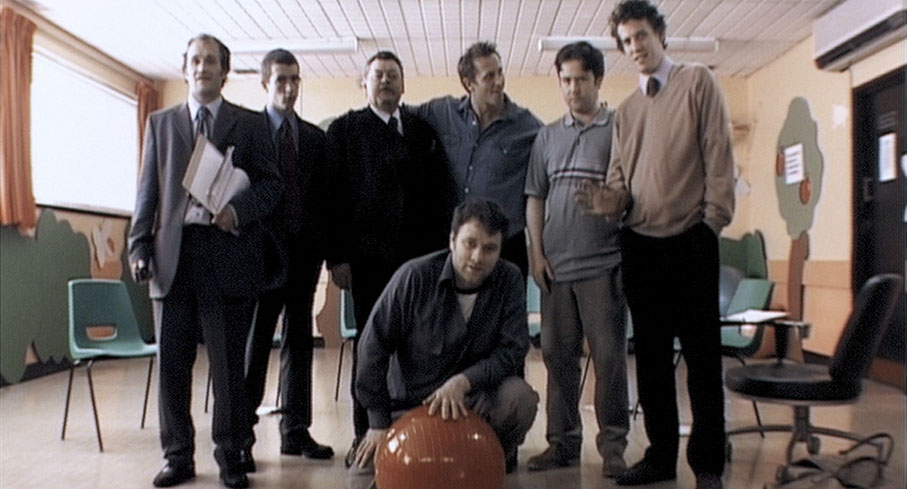
Character Studies (14:46)
Rupert Procter and Mark Devenport as Paul and Mark act drunk and wax lyrical to the camera on a variety of subjects, including cars, football, money, modern philosophy and women. There is no introductory text, but the press release confirms that these were improvisational exercises, presumably to develop the characters and material to be included in the script. It certainly has its moments. When talking about women, Mark boasts with a salacious grin, “I’ve had a lot of women, I have, in the back of my cab,” then after reflective pause, “I haven’t had sex with them, I’ve just driven them home.” The most amusingly odd comment comes from Paul when he drunkenly says, “I ended up with a woman who was about two inches taller than me, and that doesn’t just happen overnight, does it,” though my favourite comes from Mark when he says of philosophy, “It’s a great way of pulling your brain out and taking it for a walk.”
Video Diaries (18:53)
Four video diaries that were shot – I think – by Steven Shiel after the release of One for the Road, for and initially featuring Chris Cooke. In the first, Cooke breaks down how an outline becomes a script and is then workshopped with the actors to develop the dialogue. In the second, he sets the scene for a demonstration of the workshopping technique with actors Mark Devenport and Micaiah Dring, who then introduce themselves in character and talk about the incident around which the short film being developed is structured. Finally, Dring and Davenport act out a scene from the film, improvising dialogue as they go.
Theatrical Trailer (2:03)
A snappily assembled trailer that does contain a couple of spoilers, but shifts at such a pace that this will only be a problem if you watch this just before sitting down for the movie itself. And why would you do that?
Image Galleries has two subsections. Promotional Materials consists of 45 screens of publicity photos, press book pages and poster imagery, while Original Screenplay has the entire script reproduced over 52 screens, with two pages per screen. This makes for an interesting comparison with the finished film.
Map of the Scars (1998) (11:06)
Cooke’s first short film to be made with outside funding is an impressionistic study of a tormented, alcoholic and intermittently violent kleptomaniac, who talks to the camera about his life, his demons, and the hotels in Jersey, the island on which the film is set and on which Cooke spent his early years. Experimental in structure, with Annie Watson’s fractured editing reflecting the mental state of the unnamed central character. A lot of work clearly went into this (some of the blink-and-you’ll-miss-them cutaways must have taken some effort to arrange and shoot), and some of the techniques employed in One for the Road are being road-tested here and are pushed to an even further extreme. I really liked it.
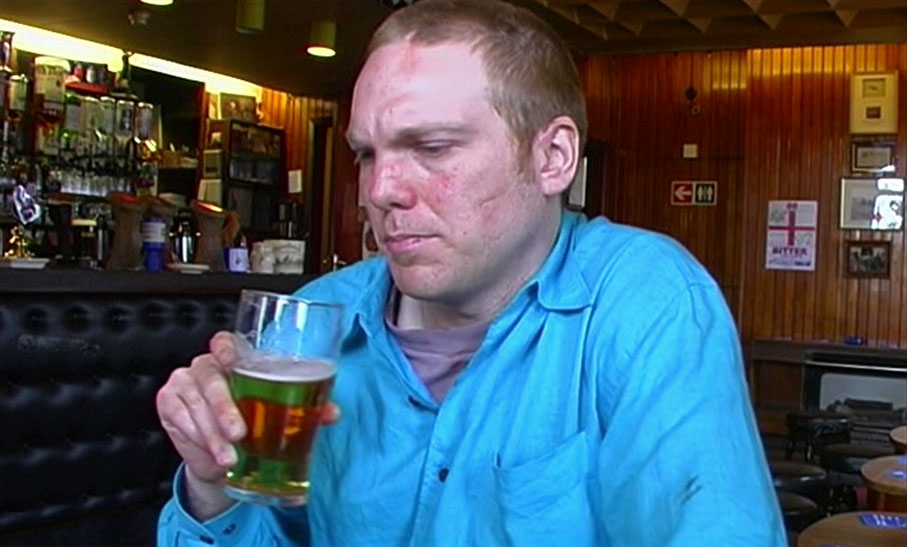
This can also be watched with a commentary by writer, director and co-cinematographer Cooke, who talks about the origins of the project, the visual style, the advantages of shooting on DV, the score, his collaboration with editor Annie Watson, and more. He also describes Jersey as, “80,000 alcoholics clinging to a rock,” a phrase that’s apparently in common use there.
Shifting Units (2000) (8:28)
The short film from which One for the Road eventually sprang, this study of a washed-up, self-deluded and alcoholic salesman plays like the backstory film for the character of Paul in the subsequent feature, who is again here played by Rupert Procter. A midway point between the impressionistic experimentation of Maps of the Scars and the multi-character drama of One for the Road, it condenses the wasted hopelessness of the Paul from the later film into a tightly-wound eight-and-a-half minutes of screen time, and would make a great pre-feature taster at every screening. Mark Devenport also has a brief role as a participant in the very sort of alcohol management group that brings the characters together in the later feature.
This can also be played with commentary by Cooke, on which he has been joined here by this film’s producer Helen Solomon, and its executive producer Kate Ogborn. Quite a bit is packed into the brief running time, including how the film came about, the mix of scripted elements and improvisation, casting the lead role, and working with editor Annie Watson to cut the film down from 15 hours of footage. Cooke emphasises the fact that this was always intended as a stand-alone piece and not a promo for a later feature, and that it was intended as a character study of someone who had let his work take over and ultimately destroy his life.
Why I Hate Parties (But Pretend to Love Them) (2003)(10:32)
Directed by Mark Devenport with the cinematography duties shared between Chris Cooke and Donna Bowyer, this short DV-shot film follows young Colin (David Hoare) to a party as he expresses his insecurities and social awkwardness at such events. A flipside of the golden rule of ‘show, don’t tell’, almost every aspect of Colin’s angst is expressed through his less-then sparkling thoughts voiceover. Of interest, definitely, but I couldn’t help thinking how good this could have been had Davenport dumped the narration and found a way to express this all in purely audio-visual terms, and that’s coming from someone who had a similar relationship to parties in his youth. Looks good, though.
Gary the Rapper vs Stefan Blix (2014) (13:50)
Overweight and suited family man Gary (Dean Palinczuk) enlists the help of washed-up musician Stefan Blix (Steve Blackman) to create a busting backing track for his rap lyrics, but doesn’t reckon on having to deal with Stefan’s unstable relationship with his girlfriend Martine (Holly Lucas). It’s no surprise that the ghost of Shane Meadows’ 2009 Le Donk & Scor-zay-zee hovers over Gary the Rapper vs Stefan Blix, given that Dean Palinczuk not only played titular rapper Scorzayzee in Meadows’ film, but is credited here under that stage name both as actor and co-writer. Directed, co-written and co-produced by Mark Devenport and shot in handsome monochrome HD by Chris Cooke and Tristan Ofield, it’s a testament to how far Devenport developed as a director, both in his visual style and his handling of actors. Palinczuk is quietly amusing in an effectively deadpan way as Gary, but it’s Blackman who effectively steals the film as Blix, his dishevelled scrawniness and singular delivery at times reminding me of a young David Thewlis. Thin on plot, sure, but 14 minutes of comic character drama well spent nonetheless, and the music’s not at all bad.
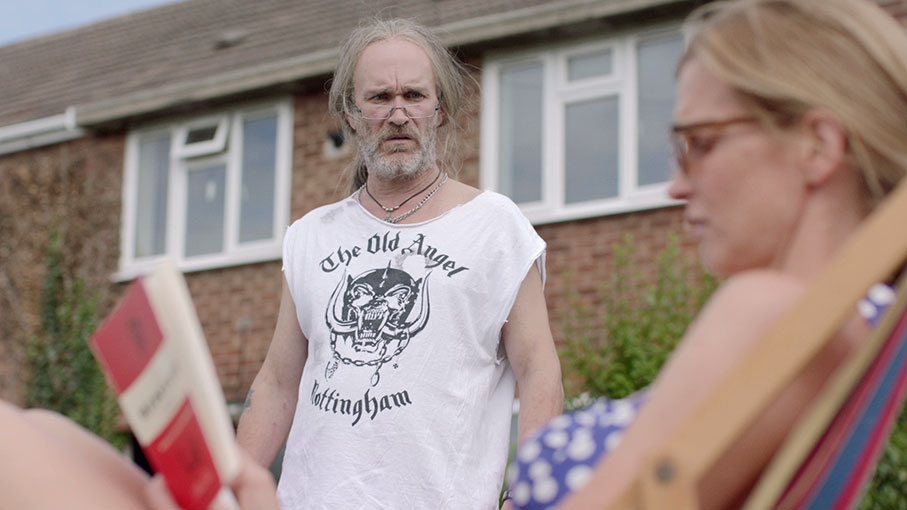
Whiskers and Jane (2016) (13:32)
Mark Devenport’s confidence and way with actors and characters is further showcased in this gentle, tender portrait of ageing former rock musician Whiskers (Rupert Procter) and his faltering relationship with his attractive German partner Jane (Cosima Shaw). The main theme is established in the opening minutes, as the long-haired, grey-bearded Whiskers wakes up next to Jane and she berates him for failing to fix the alarm clock as promised, leaving him to contemplate his fading looks and his paunch of a belly. A constant reminder of his age-related downhill slide is provided by a muscular next-door neighbour who seems to spend every hour of every day topless in his front garden pumping iron, but who also, it is later suggested, may be just a manifestation of Whiskers’ insecurities. Written by Devenport and Steve Blackman, it’s very nicely handled, most engagingly performed, and attractively shot by Alistair Little. And yes, booze once again plays a crucial role in the story.
Booklet
The lead essay here is by Nottingham-born critic and researcher Thirza Wakefield, who does a sparkling job of deconstructing the lead characters and the psychological issues that make them the ultimately self-destructive men that they are. This is followed by two interviews with writer-director Chris Cooke, both conducted shortly after the film’s release, the first by Jared Wilson for the Nottingham-based magazine and website LeftLion, the second by Dave Calhoun for Time Out. Concluding the commentary are extracts from four of the positive contemporary reviews of the film. Full credits for the feature and for each of the short films on the disc are also included.
I’m unforgivably late with this review thanks to a wisdom tooth removal that became horribly infected and left me feeling like crap for couple of weeks (and has still not fully healed, the evil bastard). Oddly enough, this felt like the perfect state in which to watch Chris Cooke’s energetic, insightful and refreshingly unglamourous portrait of the capitalistic macho drinking culture at its least appealing, as I felt at times as woozy as the characters looked and were presented by the filmmakers. Some will still dislike it intensely, but it’s a film I have so much time for and could have written far much more about were time not such a restraint, and Indicator’s Blu-ray builds on the previous DVD to create what has to be as close to dammit a definitive release. For those who are game, highly recommended.
|